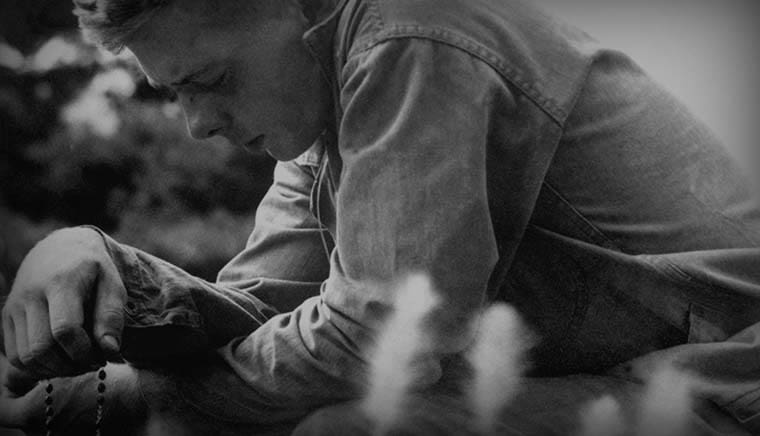A blog for Catholic men that seeks to encourage virtue, the pursuit of holiness and the art of true masculinity.
The Power

I could have the power.
If I had faith, true faith, I could work miracles. But I don’t, so I can’t. Thank heavens for that, because there’s no telling what I’d do.
But then that’s false, isn’t it, since if I had that kind of faith I wouldn’t pull any shenanigans: no petitioning God to strike down Al Qaeda and the Taliban where they stand. Let alone pleading with the saints for a Bugatti Veyron in my driveway.
This is one case where power doesn’t corrupt and absolute power saves the world.
I might through prayer be able to heal the sick or move a mountain (although why I’d want to move a mountain and where I’d put it are questions I can’t answer), but there are surely things even a person of true faith cannot accomplish – no matter how perfectly he or she prays.
In the case of mountain moving, Jesus was stating a fact, describing an aspect of His divine capabilities. But that hardly means even the holiest saint could accomplish the same. Jesus could pick up Mount Tabor and plunk it down in Death Valley, but why would he? For show? Hardly.
The power of prayer alone is insufficient to bring another person to faith in Christ. Prayer isn’t a club to use for conking somebody, Alley Oop style, and dragging her into the Church. My prayer can’t stand in the place of her assent – or her resistance.
In this regard I admire the wisdom of the Protestant satirist Jonathan Swift: “It is useless to attempt to reason a man out of a thing he was never reasoned into.” But the power of prayer helps – especially if the person for whom you are praying knows you are doing so.
It may lead her to think that, after all, God, if He exists, must have the power to answer prayers. In other words, it disposes her mind towards God.
“How do we obtain this power?,” Pope Francis asked rhetorically last month during an Angelus address. “We obtain it from God in prayer. Prayer is the breath of faith: in a relationship of faith, of love, one can’t omit dialogue, and prayer is the dialogue of the soul with God.”
To pray is to acknowledge the ground of being. To pray every day is to always be remembering who’s in charge here.
And when you have something to pray for, you pray. Usually you pray for something that appears to be outside your own power to achieve. Nobody prays, “O, Lord, let there be milk in the fridge!” No, you go to the store and buy a half-gallon yourself. You pray for the healing of a sick friend. You pray to be delivered from your own selfishness and sin.
Everybody has some or another intention to put before our triune God. And there are times in our lives when conflict, illness, imminent death – fill in your own need – make our prayers take on a self-interested intensity that, frankly, is not especially Christian.
I prayed for my older, soldier son, when was in Iraq for a yearlong deployment. I think it is fitting that I prayed for him. Yet from the first I realized I must also offer prayers for every other soldier, marine, sailor, or airman stationed there, in Afghanistan, and wherever America’s armed forces are serving around this troubled globe. I’d pray for world peace, but I don’t want to waste my time (or God’s) hoping for what any sensible Christian knows we will not see until the Lord returns.
I’ve had the sort of education that leads me to say things in prayer such as, “O, Jesus, place your aegis over my son . . .” The word aegis derives from the Greek word for goatskin and originally referred to the shield of Zeus (or his daughter, the bright-eyed Athena), which offered protection from harm to anyone who carried it. Heck, I’d have settled for Harry Potter’s cloak of invisibility, except that, like the aegis, it doesn’t really exist.
But I prayed every day (it was programmed into my computer’s calendar and popped up each morning) that the words of our Lord from Luke 10:19 be an aegis for my soldier: “Behold, I give you the authority to trample on serpents and scorpions, and over all the power of the enemy, and nothing shall by any means hurt you.” This is the aegis of a more modern, utterly real definition: “patronage, backing, or sponsorship especially when afforded by a notable or authoritative organization, group, or individual.”
I laugh at myself when, during Mass, I’ll think: Our Notable or Authoritative Individual, hallowed be Thy name. There are times when my “rapier” wit is completely inappropriate. At least I’m at Mass.
But appeals to a Higher Authority (think of the prayer folks say in AA, adapted from Reinhold Niebuhr’s Serenity Prayer) are often made by people without “faith.” An atheist witnessing some impending disaster won’t stand mute, he’ll say “Oh, God, no!” He goes there because he has nowhere else to go.
The paradox of the power of prayer is in its reminder that in seeking something big, we must become nearly nothing. Because it is not the saint who heals, but God through the saint, whose humility makes it possible, makes a mere man a conduit for God’s love and power.
As for that Bugatti, it is a beautiful automobile, an almost miraculous 1000-horsepower marriage of engineering and art, but its wheelbase is too wide to pass through the strait gate.
Brad Miner. “The Power.” The Catholic Thing (November 4, 2013).
Reprinted with permission from The Catholic Thing. All rights reserved. For reprint rights, write to: info@thecatholicthing.org.
COMMENTS
Reader Interactions